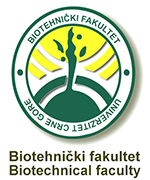Partners : BTF
 Biotechnical faculty, University of Montenegro, Montenegro (BTF)
Biotechnical faculty, University of Montenegro, Montenegro (BTF)
University of Montenegro, M. Lalica 1., 81000 Podgorica.
Phone: +382 20 268 437; Fax: +382 20 268 432
www.btf.ac.me; e-mail: btf@ac.me
1. Institution was established in 1937 as the experimental State Research Station for Southern Cultures in Bar. After WW II, Institution was placed in Podgorica as Institute for Agricultural Research. 1961-1997 the name was The Agriculture Institute; in 1997 it was transformed into Biotechnical Institute. By establishing of Studies of Agriculture in 2008 formally changed the name into Biotechnical Faculty.
2. The activities of the Biotechnical Faculty are Higher education, Scientific research and Expert and advisory (Services). The higher education is organized through academic and applied study programs. The academic study programs are organized as basic academic studies (3 years), postgraduate specialist studies (1 year) and postgraduate master studies (1 year). Basic academic studies are conducted through two study programs: Plant production and Animal husbandry. Postgraduate specialist and master studies within the Plant production study program are organized in three directions: Fruit growing and viticulture, Crop and vegetable farming and Plant protection. Scientific research activityof the Faculty is realized through fundamental and applied research in the field of agriculture, veterinary medicine and forestry. The research is carried out in ten centers specialized in different areas: for this project proposal most important is Center for Plant Protection. And Professional and Extension Services. An integral part of the Biotechnical Faculty consists of two professional services meant to implement their activities through the field centers and offices distributed over the whole Montenegro. For proposal is important Extension Service in Plant Production. From practical point of view one of 6 laboratories of Center for Plant protection will be included in the project and in terms of the use of existing facilities and purchase of equipment.
3. The key areas of research, for researcher from the BTF team, are entomology and nematology as well as other animal groups that can be considered as pests in agriculture, medicinal and veterinary sector. Control of invasive animals and their ecology.
4. Research activities of BTF team will be in WP1, training throught WP2 and all administrative tasks, overall screening and managing the Project through WP3 and WP4.
5. From 2001 and time when invasive species of mosquitoes St. albopicata has been detected and first time reported from Montenegro, researchers from the Faculty are involved in surveillance of mosquitoes. Numerous researches has been done in this over 10 years on voluntary base and they are recorded through scientific papers: Invasion of the Stegomyia albopicta to a part of Europe, 2006;
Invasion of the Aedes albopictus to Eastern Mediterranean Area, 2009; Status of Stegomyia albopicta (Aedes albopictus) in Federal Republic of Yugoslavia (FRY), State Union of Serbia and Montenegro (SCG), Republic of Montenegro (ME) and Republic of Serbia (RS) done for World Health Organization Regional Office for Europe, 2011; Invasive mosquito species in Europe and Serbia, 1979 – 2011, 2012 etc. In 2012 national research project has been found and launched by Ministry of Science in Montenegro - “Determination of distribution and abundance of invasive species of invertebrates St. albopicta in Montenegro” (2012-2014). The developer and team, including team leader, of the project are researchers that make this project proposal. Based on the results of this project couple of scientific papers are published such as Stegomyia albopicta Skuse, 1894 (Diptera: Culicidae) on Luštica peninsula 2011-2012, 2013; Using the oviposition traps for invasive mosquitoes surveillance - case of Stegomyia albopicta; 2012...
